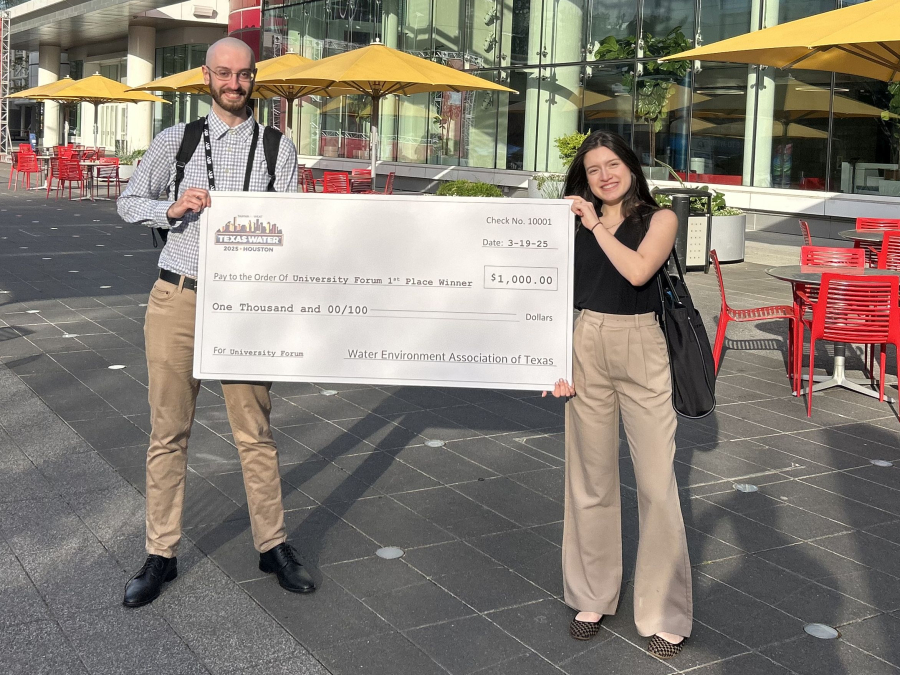A pair of master’s degree students in the Civil and Environmental Engineering Department at the Cullen College of Engineering took home first place for their presentation at the Texas Water 2025 conference in March.
Jessica Alanis and William Vines are both studying Environmental Engineering and are advised by Hanadi Rifai, Moores Professor and the director of the Hurricane Resilience Research Institute. Their 20-minute presentation, “Per- and Polyfluoroalkyl Substances (PFAS) Remediation using Colloidal Gas Aphrons,” won the University Forum Technical Session.
Their research, conducted in collaboration with GSI Environmental, focused on a novel PFAS remedial technology targeting contaminated groundwater. PFAS are a manufactured class of chemical contaminants made to be oil and water resistant that have been used in industry and commercial products since the 1940s. They are persistent in the environment due to their unique chemical structure, and as a result they are not easily removed using traditional wastewater treatment methods.
In initial experiments, the researchers used Rose Bengal as a surrogate for PFAS and employed aphrons generated from Lauric Arginate to evaluate removal efficiency. When they transitioned to testing with PFAS-contaminated water, they achieved high average removal rates up to 90% across all PFAS chain lengths, depending on the aphron dosage applied.
Alanis and Vines said they were excited to learn their presentation had won.
“Since it was my first time presenting at a conference, it felt like a great accomplishment,” Alanis said.
Vines added, “It was honestly very surprising and unexpected, since I enjoyed each of the other presenters’ research topics and presentations.”
Both stressed the importance of water quality when it came to why they were pursuing their line of research.
“PFAS treatment is crucial because these compounds do not degrade in the environment naturally, but many of the available technologies are either very energy intensive or time consuming,” Vines said.
“Water quality is important to both human and environmental health, and researching potential remedial technologies is a great way to contribute to its protection,” Alanis said. “It’s interesting to work on solutions that could have a real, practical impact.”
When asked who had been important in allowing her research to thrive, Alanis said, “My graduate research advisor, Dr. Hanadi Rifai, along with my colleagues at GSI Environmental Inc. – Charles Newell, Poonam Kulkarni, Hassan Javed and Nicholas Johnson. Their support and guidance have been really valuable.”
“The people who have been most fundamental in my academic success are my graduate research advisor, Dr. Rifai, as well as other faculty members in the environmental engineering department that have pushed me to do my best, like Dr. Stacey Louie, Dr. Mim Rahimi, and Dr. Devin Shaffer.”

![Hanadi Rifai [left] with Jessica Alanis and William Vines. Hanadi Rifai [left] with Jessica Alanis and William Vines.](/sites/ccoe.egr.uh.edu/files/images/news/2025/water-association-awards-01-crop.jpg)